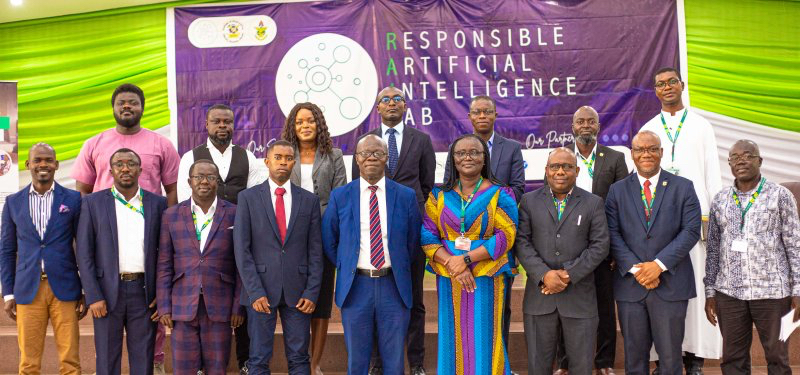
Audio By Carbonatix
Authorities at the Kwame Nkrumah University of Science and Technology (KNUST) are rolling out a scientific project to strengthen capacities in the responsible utilization of artificial intelligence (AI).
The project aims at developing and applying AI tools for the advancement of computer, social, biomedical, and agricultural and ecological sciences.
It also seeks to provide innovation and technology and the socio-ethical application of inventions.
The project is dubbed “Responsible Artificial Intelligence Lab (RAIL)”.
Vice-Chancellor of the KNUST, Professor Mrs. Rita Akosua Dickson said the novelty would provide an approach to sustainably groom local talents to engage in multidisciplinary and responsible AI for development research.
Addressing an inception workshop, she said that: “RAIL is one of the several technology-driven scientific projects that researchers from the KNUST are leading,” the Vice-Chancellor said, explaining that the agenda was to realise the Sustainable Development Goal (SDG) 17 Target 6. The Goal prioritises knowledge sharing and cooperation for access to science, technology and innovation. In the case of Ghana, the KNUST, through the RAIL project, would be working with its partners at the Université Alioune Diop de Bambey, Senegal, University of Cape Verde, and the Gambia Technical Training Institute to advance the vision of the initiative”.
Prof Dickson added that: “the stakeholders would share knowledge to prepare the country and the sub-region to make a significant contribution towards the projected 42.2 per cent growth in global AI market share from 2020 to 2027. At the heart of this project is inclusion, diversity, gender mainstreaming, innovation and responsible use of technology and socio-ethical application of inventions”.
The project aims at supporting the most vulnerable communities in Ghana, Senegal, Cape Verde, and the Gambia among others in the Sub-region.
Principal Investigator and Scientific Director of RAIL, Prof. Jerry John Kponyo revealed the Fourth Industrial Revolution was an AI-powered revolution and would require the use of digital technologies to improve key sectors of the economy.
“Africa, and for that matter the sub-Region, must strategically position itself to lead the revolution,” he said.
Provost of the College of Engineering-KNUST, Professor Mark Adom-Asamoah indicated the college through hard work had become the driver of innovative solutions for national development.
“At a time when the use of AI had become contentious, with the prospects of its use looking unpredictable, what remains significant is the need to prepare scientists to be ethical and responsible with their use and application of AI,” he said.
The key sponsors of the project include the Deutsche Gesellschaft fur Internationale Zusammenarbeit (GIZ), International Development Research Centre -Canada, and SIDA, a development organisation.
Latest Stories
-
Akwaba Magic marks five years, promises more original Ghanaian content
15 minutes -
Inflation falls to 3.3% in February, lowest since 2021 rebasing
16 minutes -
2026 World Cup: ‘Stingy’ Black Stars should be generous for ‘spiritual backing’ – Prince Tagoe
22 minutes -
Justice, Divine Jailbreaks & The Republic’s Headache
23 minutes -
‘We are ever ready to host the 2026 WAFCON if Morocco is not’ – South Africa Sports Minister
25 minutes -
National Service Authority moves to resolve staff concerns over flagged payment records
33 minutes -
AICL workers urge gov’t to fast-track talks with Hong Kong Investor to revive former ATL
38 minutes -
Ho teaching hospital sees off Dr. John Tampouri, Dr. John Korbuvi into retirement
56 minutes -
Ghana’s inflation drops to 3.3% in February, lowest since 2021 rebasing
59 minutes -
CAF to announce 2026 WAFCON decision in 48 hours
1 hour -
The messaging crisis behind vote selling in Ghana
1 hour -
First US soldiers to die in Iran conflict are identified
1 hour -
11 injured in head-on collision on Cape Coast-Takoradi Highway
1 hour -
‘This is the best I have seen the team play’ – Bjorkegren praises Black Queens win over Russia
1 hour -
ECOWAS Commission slot traded for AU Chairmanship — Nana Asafo-Adjei Ayeh alleges
1 hour

